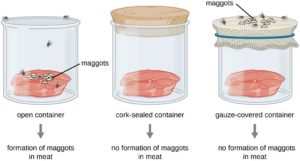New critics revolutionized American writing and literature analysis, by using analytical laws to determine the quality of writing. It was believed that literature must be logically analyzed in terms of laws, but this logic is illogical. Logic is defined to be “reasoning conducted or assessed according to strict principles of validity” by the Merriam Webster Dictionary, and it indicates that logic is subject to change when the reasoning focuses on different assessments and therefor cannot be restricted to such a narrow point of view of law.
Percival Everett attacks New Critics of their flaw in logic with his poem, “Logic”. Everett writes in “5” of “Logic” that “From rags and dust a rat is formed in the cellar. It was not there before. Only rags and dust.” (Everett 69). According to the poem, the rat was able to spontaneously form from nothing besides rags and dust. This seems like a reference to a example of spontaneous generation in the Britannica, “pieces of cheese and bread wrapped in rags and left in a dark corner, for example, were thus thought to produce mice, because after several weeks there were mice in the rags”. This is a theory that is debunked today and an example of how is shown below, but it was a logical assumption before because they were unable to assess other facts like the rat may have dug a hole and made shelter in the cellar.
The poem “6” of “Logic” ponders on the logic of “seven” as an idea. It mentions that “Seven men lost, but not seven.” (Everett 70). The idea of seven will always survive even when the men that were seven is lost. This poem claims that the idea of the number seven will remain, but there is no poem “7”. The number seven was lost and the poem “6” is illogical when this fact is assessed, but in another point of view, poem “6” is on page 70 and therefore the idea of seven still lives on in the page number. There is also the point of view that it is illogical for a poem of the idea of seven is in a poem named “6”. Despite all these varying point of views, each and every one of them assessed different aspects more than another and led to similar and different reasoning.
Everett unleashes an attack on New Critics because everything can not be seen in the same mode of logic. The logical point of view of spontaneous generation in poem “5” was a well-accepted theory long ago, but given new assessments, the logic is now flawed. Poem “6” brings up different logical point of views that assess the logic of the poem. They are logical in their own way showing that there can be multiple point of views and still be right. Reading can lead to multiple point of views and because of what you assess does not make your point of view any more logical than another’s.
https://www.britannica.com/science/spontaneous-generation
Everett, Percival. re:f (gesure). Abani, Chris. Red Hen Press. Los Angeles. 2006
https://www.merriam-webster.com/dictionary/logic
https://courses.lumenlearning.com/microbiology/chapter/spontaneous-generation/

